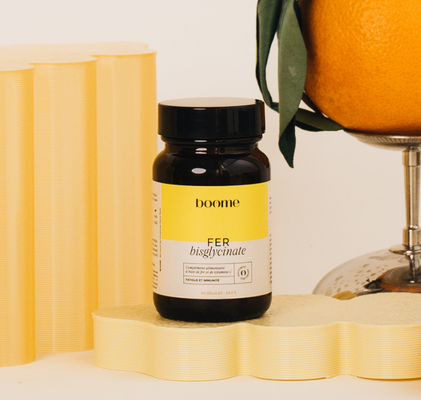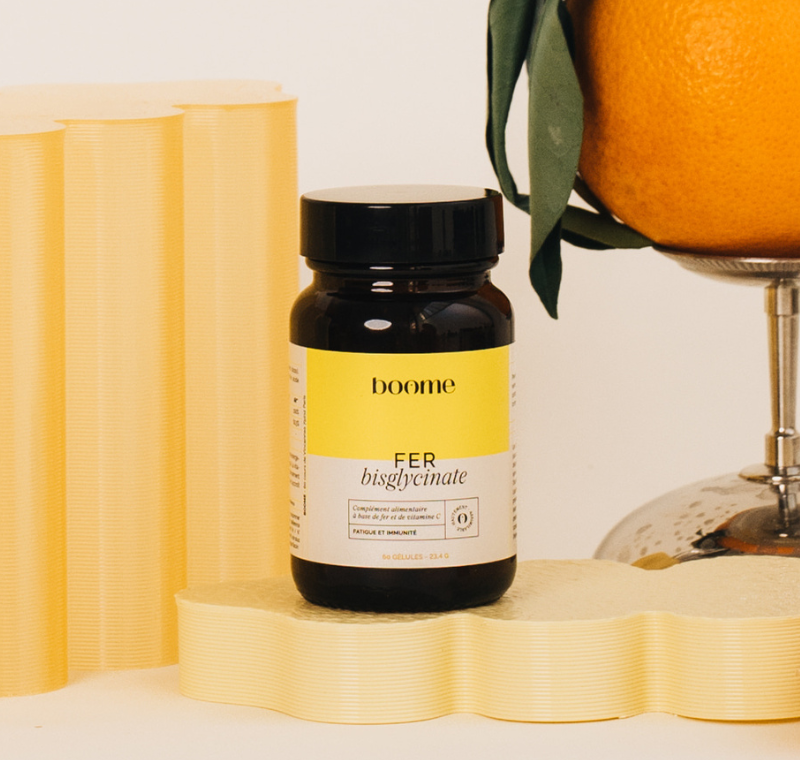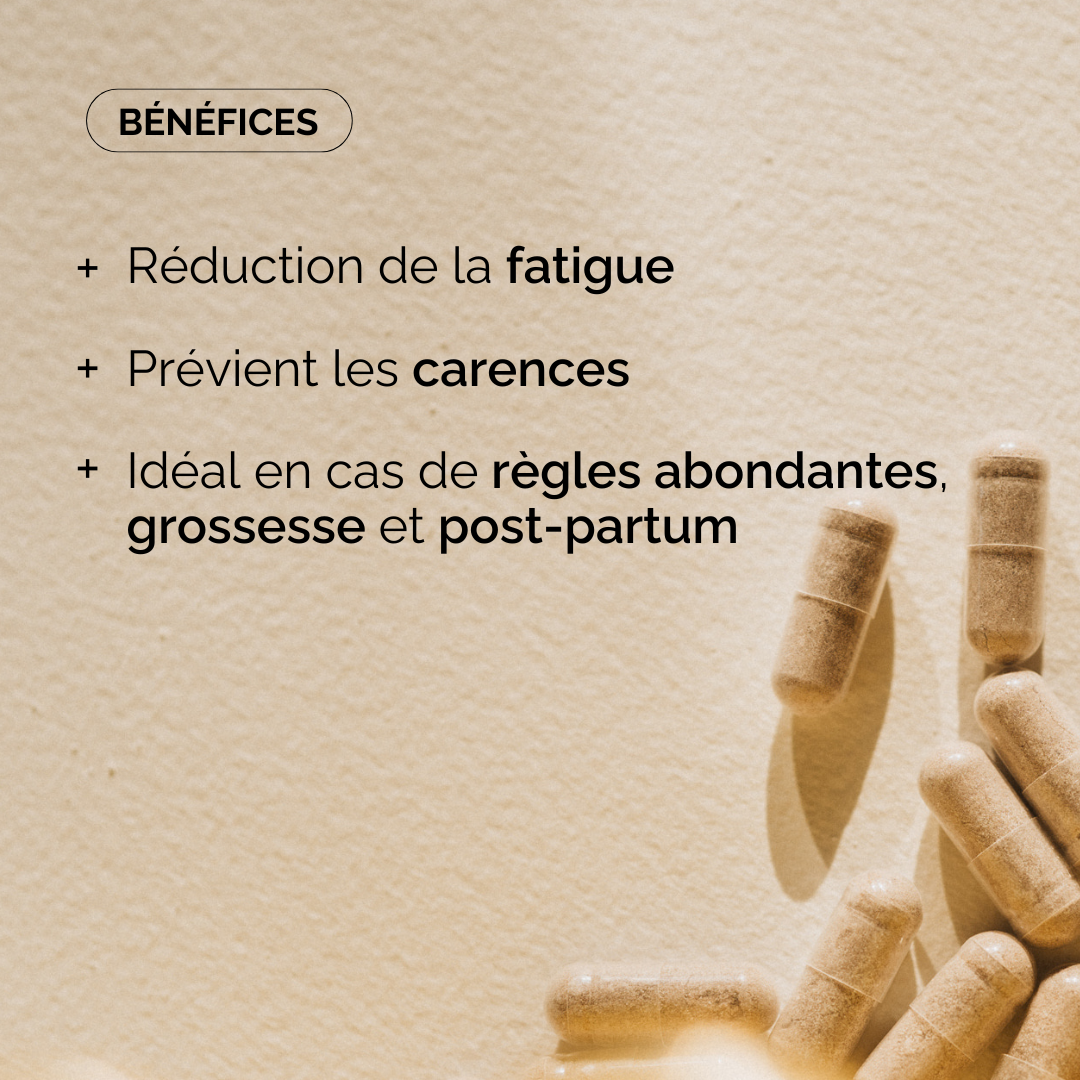
If you are (or have been) pregnant, you know how recurrent the topic of iron is during pregnancy. Yes, it's a mineral essential to our well-being, as it orchestrates the production of red blood cells and the proper functioning of the bone marrow. This mission is even more vital for pregnant women, whose iron needs skyrocket to support the pregnancy and fetal development. However, even if not everyone is prone to it, deficiency anemia remains common and should not be overlooked. What are the symptoms? How to treat it? Well, we'll tell you everything, here we go.
What is the role of iron in the human body?
Iron plays a crucial role in the proper functioning of our body, especially in pregnant women.
Why do we need iron?
Without iron, your body wouldn't be able to produce enough healthy red blood cells. So, it's a pretty useful element for good health! It plays an essential role in:
- the transport of vital oxygen in your body;
- the conversion of nutrients into energy.
During pregnancy, iron becomes even more important. It supports the healthy development of the fetus and placenta, but not only that! It also helps prevent iron deficiency anemia, a condition that can make pregnancy a little riskier.
How much iron do you need?
According to ANSES , iron requirements differ according to sex and life stages:
- Approximately 11 mg/day in men and postmenopausal women or those with light bleeding ;
- Approximately 16 mg/day in women who have heavy bleeding, are pregnant or breastfeeding.
Note that a normal diet provides between 10 and 15 mg of iron per day, of which only 5 to 10% will be absorbed by the body.

Achat express
Iron deficiency, what are its symptoms?
Iron deficiency can manifest itself through a series of different symptoms:
- Persistent fatigue that does not go away with rest.
- Pale skin and mucous membranes (reveal low hemoglobin levels).
- Shortness of breath, even after light exertion.
- A faster heart rate (because it compensates for the lack of oxygen)
- Feelings of dizziness.
In some people, iron deficiency can cause other signs such as:
- brittle nails;
- hair loss;
- headaches;
These symptoms can be more concerning for pregnant women, as they affect their own health, but also that of their unborn child.
How to diagnose iron deficiency?
To diagnose iron deficiency, your doctor will usually order a clinical assessment with a specific blood test to measure different indicators related to your iron level.
What does this blood test measure? Several factors, including your hemoglobin level: a low level can indicate an iron deficiency. This assessment involves several blood tests, such as ferritin levels or serum ferritin levels.
If they are low, there's no doubt about it: your iron stores are depleted. We can then recommend the most appropriate treatment to correct this iron deficiency anemia.
What are the most common causes of iron deficiency?
Common causes in women
One of the most common causes of iron deficiency in women between puberty and menopause is heavy periods. If blood loss is particularly intense, diet becomes an insufficient source of iron, leaving the body with depleted stores.
Because yes, sometimes, diet can no longer compensate for iron deficiencies. If it's of animal origin, it will be better absorbed by the body than if it's of plant origin. So if you're on a vegetarian diet, plan it carefully to avoid deficiencies.
Causes specific to pregnancy
Pregnancy leads to a significant increase in iron requirements, which are essential for the development of the fetus and placenta... but also for the increase in the volume of red blood cells in the mother. She must therefore strengthen her iron reserves with rich and varied foods, or risk developing a higher deficiency.
How to treat iron deficiency?
By adapting your diet
To boost your iron intake and your red blood cell count, favor animal products such as:
- red meat;
- poultry;
- the fish.
Are you a vegetarian? No problem, there are plenty of plant-based sources of iron:
- legumes (lentils, chickpeas, beans etc.);
- nuts;
- dark chocolate (yum!);
- green leafy vegetables.
You are advised to always combine these foods with sources of vitamin C, as it is known to improve iron absorption.
With supplements
If your diet doesn't help you compensate for your iron deficiency, your doctor may recommend dietary supplements. However, many pregnant women have trouble completing their course of treatment because these pills can cause stomach pain and constipation. Except that THE time when they are most likely to be anemic is right at the end of pregnancy! Potential internal bleeding during childbirth could then be dramatic.
At Boome, we have chosen to develop a dedicated iron food supplement , based on patented chelated iron (bisglycinate) and vitamin C to maximize its absorption. Our iron benefits from excellent intestinal tolerance (goodbye to iron that hurts your stomach) and optimal bioavailability .
If you use our pregnancy vitamins , be sure to take them separately from your supplements. Because iron, when mixed with other ingredients, oxidizes certain molecules and can reduce their effects. It is recommended to take the vitamins in the morning and the iron treatment in the evening.
Are you pregnant and don't know where to start when it comes to vitamins? Find out how to choose the right pregnancy vitamins .
Intravenously
In cases of severe anemia or when oral supplements are not well tolerated, intravenous supplementation may be considered. This method allows for a rapid increase in ferritin levels in the body. It is generally reserved for situations where intestinal absorption is compromised. Or when iron stores need to be rapidly replenished, such as in preparation for surgery.
Concluding on the importance of iron in our bodies means emphasizing the vital role red blood cells and bone marrow play in our health. Especially if you're pregnant! An iron deficiency, while common, can have serious consequences for your well-being and that of your unborn child. But with a balanced diet, the right supplements, and, in some cases, specific medical treatment, you'll maintain solid iron stores for a smooth pregnancy and incredible energy!











